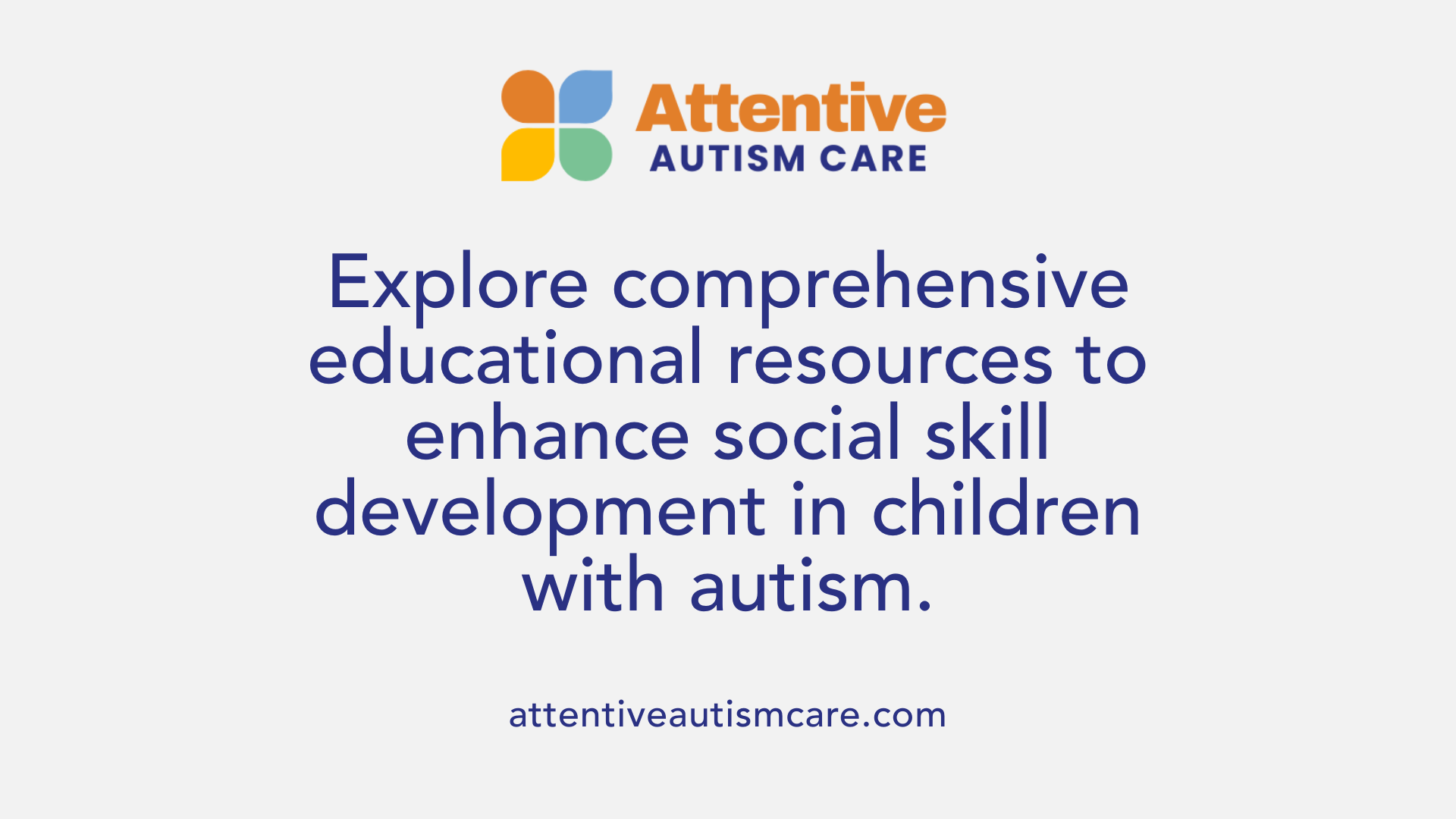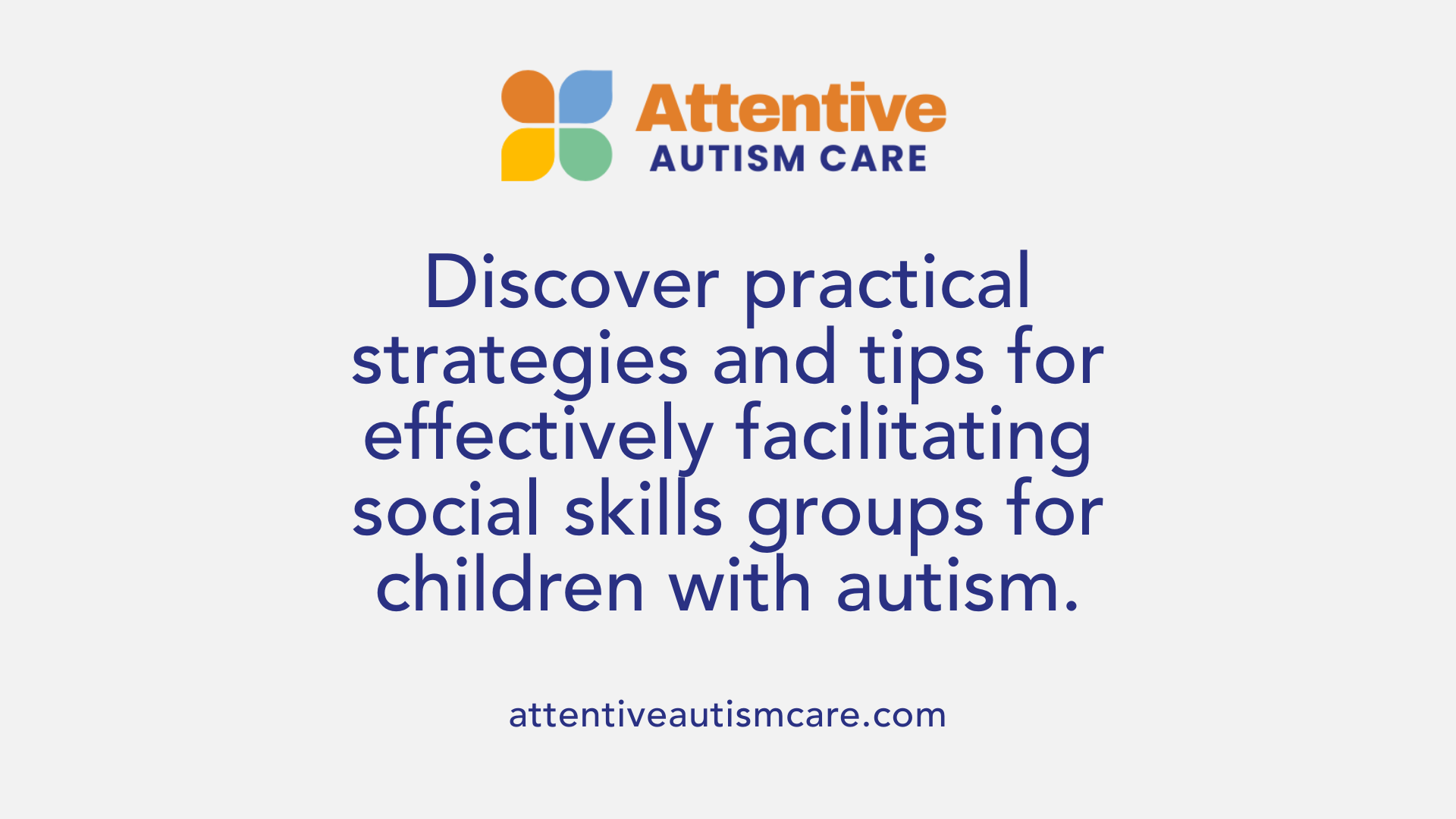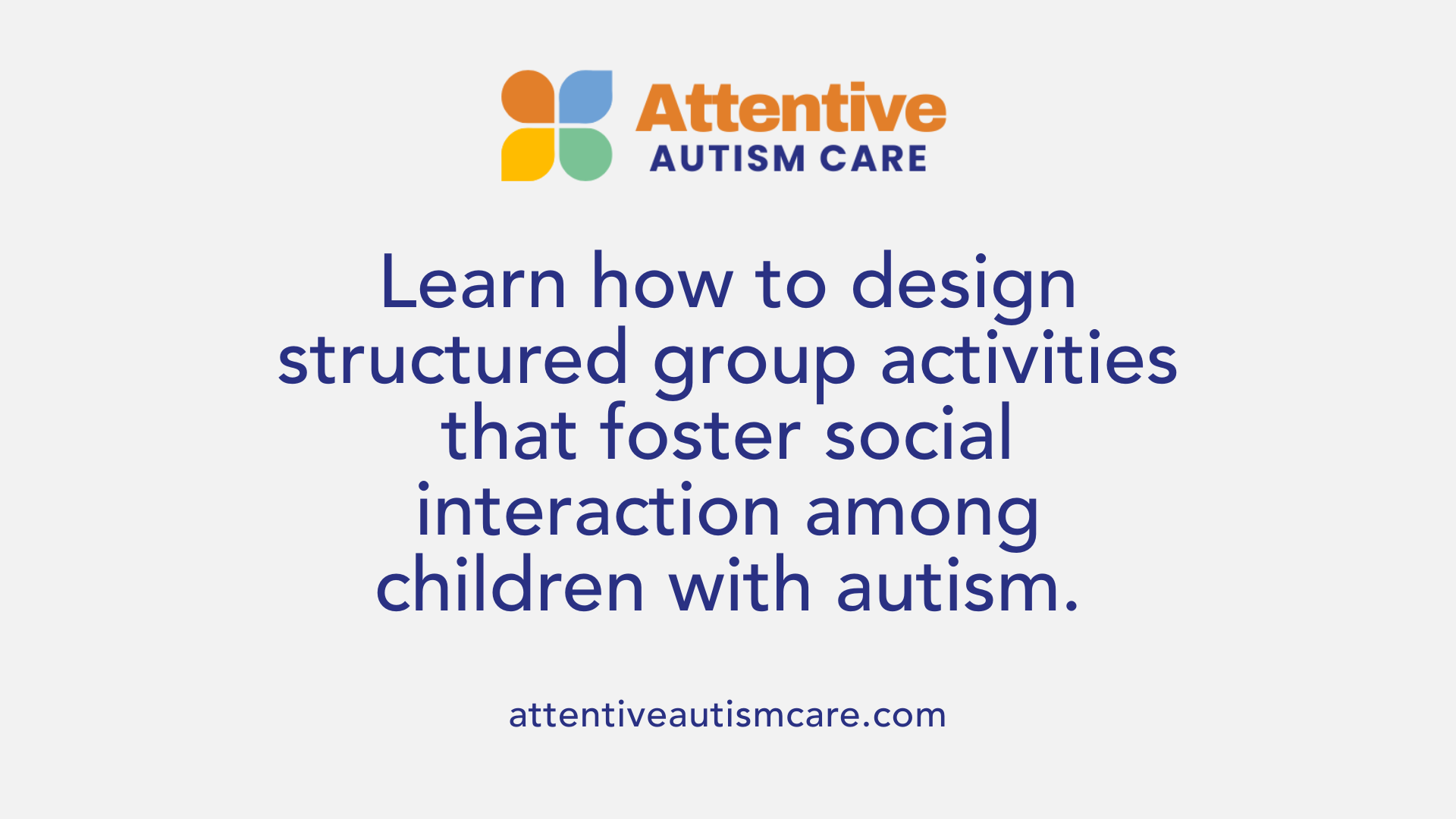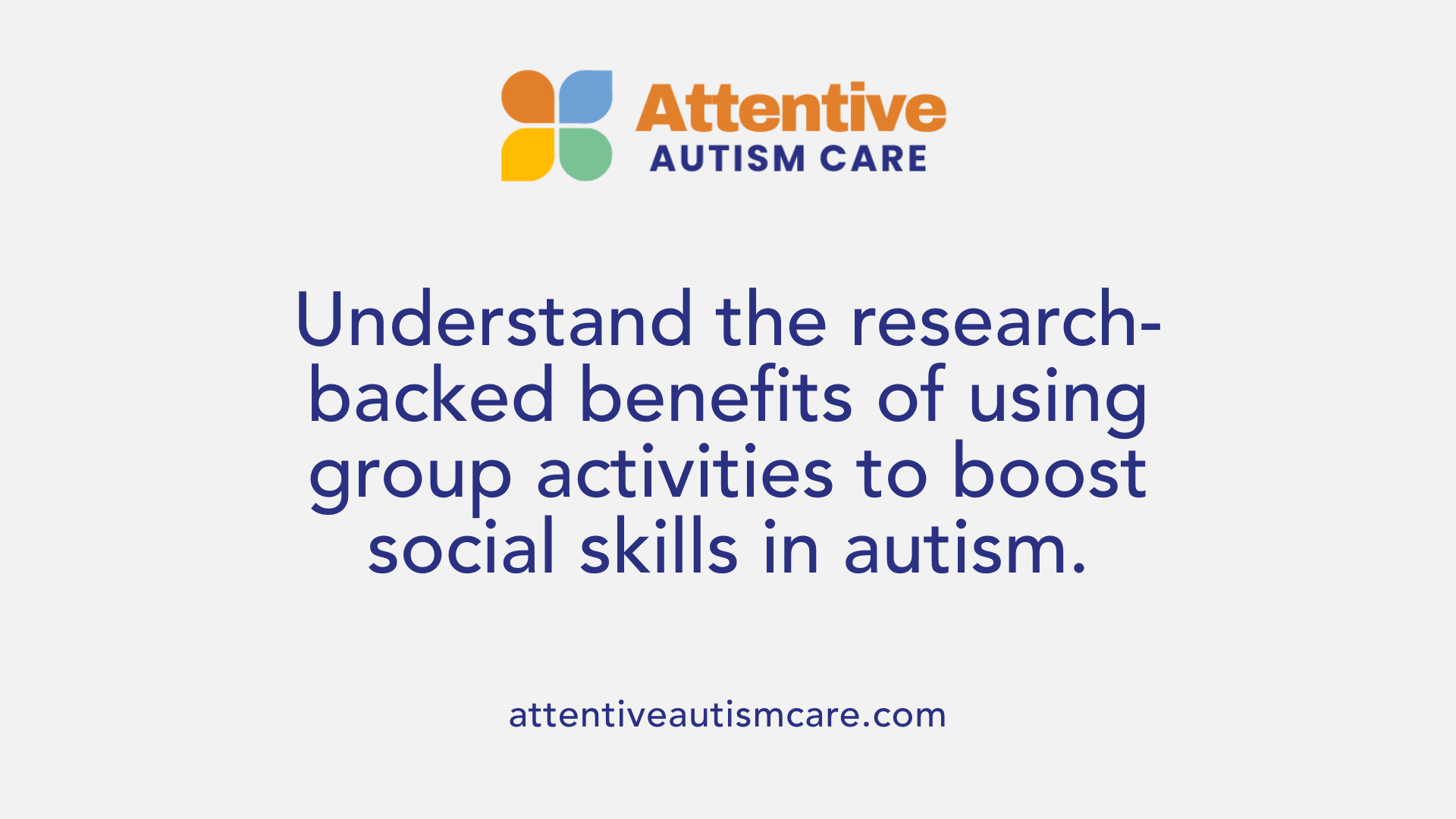How to Use Group Activities to Support Autism Social Skills
Fostering Connection and Social Growth in Children with Autism

Harnessing Group Activities for Effective Autism Support
Children with autism often face challenges in developing social skills, which are crucial for their overall well-being and integration into peer groups. Structured group activities, when thoughtfully implemented, can serve as powerful tools to promote social competence, empathy, communication, and emotional understanding. This article explores evidence-based strategies, practical tips for facilitators, and resources that support educators, therapists, and families in using group activities to enhance social skills in children with autism.
Educational Resources and Guidelines for Using Group Activities with Children with Autism
 Are there educational resources or guidelines available on using group activities as tools to support social development in children with autism?
Are there educational resources or guidelines available on using group activities as tools to support social development in children with autism?
Yes, a variety of comprehensive resources exist to help educators, therapists, and parents implement effective group activities tailored to children with autism. These materials include detailed books, online manuals, and specialized training programs grounded in evidence-based practices.
These resources emphasize strategies such as social narratives, role-playing, peer-mediated interventions, and video modeling. They often highlight the importance of creating structured environments with small, manageable social groups where children can practice skills in a safe setting.
Visual aids like emotion cards, social stories, and picture-based supports are frequently recommended to enhance understanding of social cues and emotional recognition. Sensory activities, including fidget toys and sensory bins, are incorporated to support self-regulation and keep children engaged.
Most guidelines encourage customizing activities to align with each child's unique strengths, challenges, and interests. This can involve integrating special interests into lesson plans or providing choices during activities to foster motivation.
Furthermore, many resources include practical tools such as printable activity sheets, lesson plans, and step-by-step procedures for teaching social norms, empathy, and communication skills. They also recommend ongoing assessment and data collection to monitor progress and adjust strategies accordingly.
In summary, these educational materials equip families, educators, and therapists with the frameworks and tools necessary to facilitate meaningful social interactions through structured, engaging group activities tailored specifically for children with autism.
| Resource Type | Content Focus | Additional Features |
|---|---|---|
| Books and manuals | Strategies for social stories, role-playing, and intervention planning | Printable tools, activity templates, and visual supports |
| Online guides and courses | Evidence-based techniques for structured social groups | Video demonstrations and training modules |
| Professional training | Training on autism-specific social skill development | Certification options and ongoing support |
These resources are valuable for creating supportive learning environments and promoting social growth in children with autism, ensuring activities are accessible, effective, and personalized.
Practical Ideas and Tips for Facilitators in Implementing Social Skills Group Activities

What are some practical ideas and tips for facilitators to implement social skills training through group activities for children with autism?
Facilitators can create an engaging environment by using activities like role-playing, social stories, and group games such as 'The Name Game' or 'Would You Rather?' These activities encourage children to interact with peers, build empathy, and understand different perspectives.
Utilizing visual supports is essential. Emotion cards, picture schedules, and storyboards help children recognize emotions and social cues. Sensory tools like fidget toys, sensory bins, or slime can be incorporated to support self-regulation during activities.
Involving peers—either through peer-mediated interventions or structured small groups—can foster natural interaction and help children transfer new skills into everyday social settings. Including family members in some activities helps reinforce skills learned during sessions and promotes skill generalization at home.
Consistent positive reinforcement encourages participation and boosts confidence. Personalizing activities to match each child's strengths, interests, and challenges ensures more effective learning. For example, incorporating interests such as music, art, or favorite characters can motivate children.
Other practical tips include using digital tools like video modeling or self-modeling videos to demonstrate social behaviors. Break down social skills into small, manageable parts and teach through supported interactions, gradually increasing complexity.
Overall, applying evidence-based approaches with structured, visual, and sensory strategies, while engaging families and peers, helps facilitate meaningful social skills development in children with autism.
Strategies to Structure Group Activities for Promoting Social Interaction

How can group activities be structured to promote social interactions among children with autism?
Creating opportunities for children with autism to develop social skills requires careful planning and intentional structuring of group activities. A core aspect of this approach is the use of visual supports such as social stories, picture cards, and visual schedules. These tools help clarify expectations, reduce uncertainty, and prepare children for what to expect during activities, enhancing their comfort and engagement.
In addition to visual supports, clear goals and roles for each participant are vital. Each activity should have specific objectives, like practicing turn-taking or sharing, with children assigned roles that foster participation and collaboration. These strategies facilitate targeted skill development while promoting a sense of belonging.
Role-playing and peer modeling are valuable techniques to model appropriate social behaviors. For example, peers demonstrating greetings or sharing can serve as live examples for children to imitate. Incorporating social narratives helps children understand social norms and the reasons behind social rules.
A supportive environment that includes sensory-friendly spaces and prepares children for transitions can reduce anxiety and help them feel safe during social interactions. Additionally, positive reinforcement—such as praise and tangible rewards—encourages children to repeat desired behaviors.
Peer-mediated strategies, including buddy systems or small social groups, promote natural and meaningful interactions. These approaches foster peer acceptance and allow children with autism to practice social skills in real-world contexts.
Overall, a combination of visual clarity, structured roles, peer involvement, and sensory considerations creates an effective framework for engaging children with autism in social activities, supporting their social learning and peer relationships.
Methods and Approaches to Facilitate Social Skills Development in Groups
What strategies and methods can be used to facilitate social skill development in children with autism through group activities?
Supporting social growth in children with autism involves a combination of structured activities, visual tools, and targeted interventions. Educators often use activities that are visually supported and highly organized, such as social stories and emotion cards, to help children recognize feelings and appropriate responses. These activities promote turn-taking, sharing, and effective communication, all tailored to each child's developmental stage and interests.
Incorporating peer modeling and role-playing is particularly effective. Children observe peers demonstrating positive social behaviors, then practice skills themselves through guided role-playing exercises. Social narratives help children understand social expectations and norms, making complex social cues clearer.
Small group settings provide safe spaces for children to practice interacting. Games like Feelings Bingo or scenario-based activities like 'What Would You Do?' encourage emotional understanding and perspective-taking.
Reinforcement strategies are pivotal. Praising specific social behaviors—such as sharing or making eye contact—with praise and rewards increases the likelihood of these behaviors recurring. It’s also important to involve peers who exhibit strong social skills, who can model appropriate interactions and support skill development.
Clear expectations and visual supports, like visual schedules, contribute to predictability, helping children feel more secure during social interactions. Sensory activities and emotional regulation tools, such as calming zones or mindfulness exercises, support children in managing any emotional or sensory overload, enabling more effective participation.
By creating a comprehensive approach that combines these methods—visual supports, peer involvement, reinforcement, and sensory regulation—educators can foster meaningful social skill development, helping children with autism build confidence and competence in social settings.
Research Evidence on the Effectiveness of Group Activities in Improving Social Skills
 Various research studies indicate that structured group activities play a beneficial role in enhancing social skills among children with autism. These activities include social skills training groups, sports, art sessions, and recreational games designed to foster interaction and cooperation.
Various research studies indicate that structured group activities play a beneficial role in enhancing social skills among children with autism. These activities include social skills training groups, sports, art sessions, and recreational games designed to foster interaction and cooperation.
Evidence from carefully conducted studies, including randomized controlled trials, shows small but meaningful improvements in social interactions, communication, and understanding social cues in children, especially those with high-functioning autism spectrum disorder (ASD). These gains tend to be observed immediately after participation, with some research suggesting these benefits can persist over time.
Group activities also help reduce feelings of loneliness and increase the likelihood of engaging in social and rule-based activities, important for emotional well-being and social confidence. Activities such as role-playing, team sports, and collaborative projects create safe environments where children can practice social norms like sharing, taking turns, and expressing emotions.
While involving parents and teachers in these programs can support the transfer of skills to everyday settings, the added benefits are sometimes limited. Despite modest effects, these programs serve as valuable complements to traditional therapies, addressing the social and emotional needs of children with autism.
Overall, the research underscores that group activities contribute positively to social development, providing opportunities for children to practice social interactions in a structured, engaging context, leading to improved confidence and peer relationships.
The Autism Project and Its Role in Supporting Social Skills Development
What is the Autism Project and how does it support social skills development in children with autism?
The Autism Project is a comprehensive initiative that provides structured social skills groups specifically designed for children, teens, and young adults with autism. These groups are led by a team of professionals, including speech-language pathologists, occupational therapists, and mental health practitioners, who bring their expertise to foster social and communication improvements.
The program emphasizes creating a positive and safe environment where participants can actively practice and build essential social skills. Each child receives personalized goals and objectives, which are monitored through ongoing assessments and progress reports. This tailored approach ensures that interventions address individual needs and promote meaningful development.
Support strategies incorporated into the program include visual aids, rigid schedules, and physical structures that facilitate clear communication. The use of visuals and routines helps children understand expectations, reduces anxiety, and encourages participation.
Activities and themes are often aligned with children’s interests, making learning engaging and relevant. Respect for each child's processing pace and perspective is prioritized, providing choices to empower children and foster autonomy.
Overall, the Autism Project combines evidence-based practices with a caring, supportive atmosphere. Its focus on peer relations, reciprocal play, emotional understanding, and self-esteem aims to enhance social functioning profoundly.
The targeted strategies and structured settings of this program demonstrate its commitment to helping children with autism develop social skills that are vital for daily life and integration in broader social contexts.
Creating a Supportive Environment for Autism Social Skills Development
Sensory-friendly spaces can significantly enhance the comfort and ability of children with autism to engage socially. These spaces include calming zones equipped with sensory tools like fidget toys, sensory bins, or slime, which help children self-regulate and reduce emotional overwhelm. Incorporating calming activities such as coloring, mindfulness exercises, and grounding techniques within these areas provides children with a safe environment to process their emotions and regain composure.
Promoting the generalization of skills across various settings is essential for meaningful social development. Structured group activities, including peer-mediated interventions and collaborative projects, enable children to practice social behaviors like sharing and turn-taking in real-life contexts. Repeatedly practicing these skills in different environments—classrooms, playgrounds, or during extracurricular activities—supports their application beyond the therapy or classroom setting.
Emotional regulation strategies are fundamental in helping children with autism manage their feelings during social interactions. Techniques like the use of calm-down cards, mindfulness exercises, and grounding techniques teach children how to recognize and cope with emotions. Designated retreat zones within classrooms or play areas provide a quiet space for children to decompress when they experience emotional overload, making it easier to re-engage socially.
Inclusive activities and representation foster acceptance and understanding of neurodiversity. Celebrating events like autism awareness month or incorporating stories about autistic individuals into lesson plans promotes empathy among peers. Using picture books, biographical stories, and social stories related to autism helps children learn about differences positively, encouraging more inclusive behavior and enhancing peer interactions. These efforts create a classroom atmosphere where all children feel valued and understood.
| Aspect | Strategies | Additional Details |
|---|---|---|
| Sensory support | Sensory zones, calming tools | Designed to help self-regulation |
| Skill generalization | Diverse social activities | Practice across multiple environments |
| Emotional management | Calm-down tools, mindfulness | Reduce anxiety, improve emotional control |
| Inclusion | Celebrating neurodiversity, stories | Foster empathy and acceptance |
The Role of Parental and Educator Involvement in Enhancing Group-Based Social Skills Training
Supporting social skills at home and school
Parents and teachers play vital roles in reinforcing social skills learned during group activities. During the school day, educators can incorporate structured social groups such as lunch bunches or team projects that mimic therapy settings. These activities provide consistent opportunities for children with autism to practice turn-taking, sharing, and initiating conversations. At home, parents can reinforce these skills by engaging children in social games like 'Name Game' or role-playing scenarios that encourage expressing feelings and understanding others. Creating a routine that includes social practice helps children gradually generalize skills across settings.
Discussion and reinforcement of skills
To promote skill retention, it's important that parents and teachers openly discuss social interactions with children. Reinforcing positive behaviors through specific praise—such as “Great job sharing your toy!”—helps embed prosocial behaviors. Using behavior-specific praise and concrete rewards, like tokens or favorite activities, motivates children to continue practicing social skills. Reflecting on activities like 'Would You Rather?' or emotion recognition games encourages children to think about their social responses and understand different perspectives. Consistent discussion about social norms and expectations builds confidence and increases willingness to participate.
Communication with therapists and educators
Effective support depends on ongoing communication between parents, teachers, and therapists. Regular updates through meetings or reports ensure everyone understands the child's progress and challenges. Sharing observations about a child's social interactions helps tailor interventions more precisely. For example, if a child struggles with recognizing facial expressions, the team can incorporate targeted activities like emotion photographs or social stories into their routine. Collaboration also involves planning for transitions between environments, ensuring that strategies used in therapy sessions are reinforced at school and home. Such teamwork fosters a unified approach, maximizing the child's social development.
Maximizing Social Growth Through Strategic Group Engagement
Implementing well-structured, evidence-based group activities tailored to the needs of children with autism offers a promising pathway to enhance social skills. By utilizing visual supports, sensory tools, peer modeling, and positive reinforcement within a safe, inclusive environment, educators and caregivers can foster meaningful social interactions. Resources such as professional programs, social stories, and research-backed strategies equip facilitators to create engaging and supportive settings. Parental and educator involvement further ensures generalization of skills across environments. While research indicates modest effects, consistent and adapted use of group activities plays a crucial role in reducing social isolation and building confidence in children with autism, supporting their journey toward more active and reciprocal social participation.
References
- 24 Classroom Activities for Kids with Autism
- 10 Amazing Resources for Social Skills Activities for Autism
- Making (and Keeping) Friends: A Model for Social Skills ...
- Social Groups
- Autism and Social Skills Development
- Building Peer Connections: Autism Group Activities
- Social Skills Activities for Children with Autism




































































































